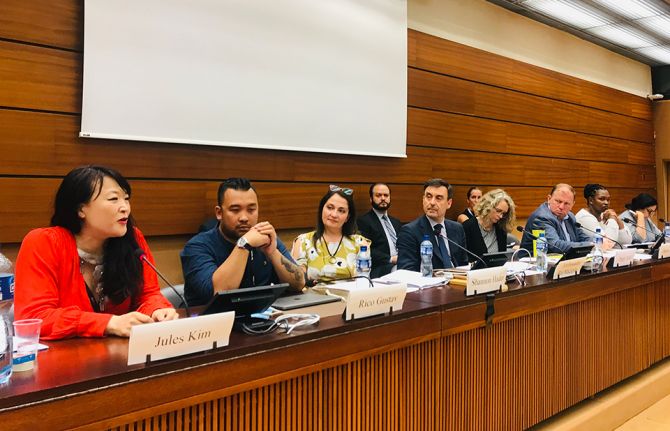

Feature Story
No end to AIDS without respecting human rights
28 June 2019
28 June 2019 28 June 2019“Sex workers are 13 times more at risk of becoming HIV positive than the general population globally. But, in Australia, where sex work is decriminalised, we have the same rate of infection as the general population. This is evidence of the importance of the legal environment” says Jules Kim, head of the Scarlet Alliance, the Australian Sex Workers Association.
The Human Rights Council first examined the question of HIV and human rights 29 years ago, in 1990. Since then, it has been steadfast in its assertion that progress in the response to the AIDS epidemic is indissociable from progress on human rights issues. Today, as it discusses new recommendations on human rights and HIV, its work is more important than ever.
A total of 48 countries and territories still maintain travel restrictions on people living with HIV. One in five people living with HIV report having been refused health care because of their HIV status, and in many parts of the world, people who use drugs and sex workers live in fear of arrest for being in possession of clean syringes or condoms.
Adolescent girls and young women are among those worst affected because of a lack of respect for their rights. In 2017, 79% of new infections among 10-19 year-old young people in eastern and southern Africa were among females. Inequalities and institutional barriers increase vulernabilities and decrease access to services. Young people in 45 countries are unable to access sexual and reproductive health services or HIV testing services without parental permission.
At a meeting held on the sidelines of the 41st session of the Human Rights Council, co-convened by Brazil, Colombia, Mozambique, Portugal and Thailand, UNAIDS Deputy Executive Director, Shannon Hader, called on countries to dismantle barriers that prevent people accessing essential services. “It has been four years since the world committed to ending the AIDS epidemic by 2030 and three years since the United Nations General Assembly adopted the High-Level Political Declaration on Ending AIDS, which included a commitment to remove human rights barriers by 2020. We have less than two years to deliver on that promise”.
The event marks the presentation of a report and recommendations on HIV and human rights being presented by Michelle Bachelet to the Human Rights Council on July 1. The report, resulting from consultations with civil society, experts, governments and UN mandate holders in February, includes best practise examples, including on the training of health workers on ending stigma and discrimination, on decriminalizing drug use and same-sex sexual activity, model laws on HIV, the training of judges and lawyers, civil society advocacy, and international funding opportunities specifically for human rights programming.
“We cannot address the human rights dimensions of HIV without civil society, who plays a critical role” stated Rui Macieira, Ambassador of Portugal to the United Nations in Geneva.
“The 2030 Agenda for Sustainable Development is an important agenda for people, planet, prosperity, peace and partnership. In order not to leave anyone behind. States should increase their efforts to reach the most marginalized,” said Peggy Hicks, director of the Thematic Engagement, Special Procedures and Right to Development Division of the Office of the High Commissioner for Human Rights.
Member states will examine the recommendations that highlight how reforming criminal laws is critical to advancing progress towards the elimination of HIV, including laws criminalizing gender expression or adult consensual sex, including sex work and same sex relations, as well as drug use. The recommendations include a call for strengthening cooperation at regional, sub-regional and global levels to support and invest in programmes and services that promote the right to health and rights of people living with HIV. This is important in the context of shrinking donor funding for HIV and health programmes, including in newly transitioned middle-income countries.
“I live with HIV, I come from a very small community, a slum area of a Kenyan city. If the recommendations of this report are implemented in a facility that I walk to everyday – a health facility, a police station, then it will work and provide us with the services we need and deserve as a basic human right.” concludes Lucy Wanjiku, a young woman living with HIV.



